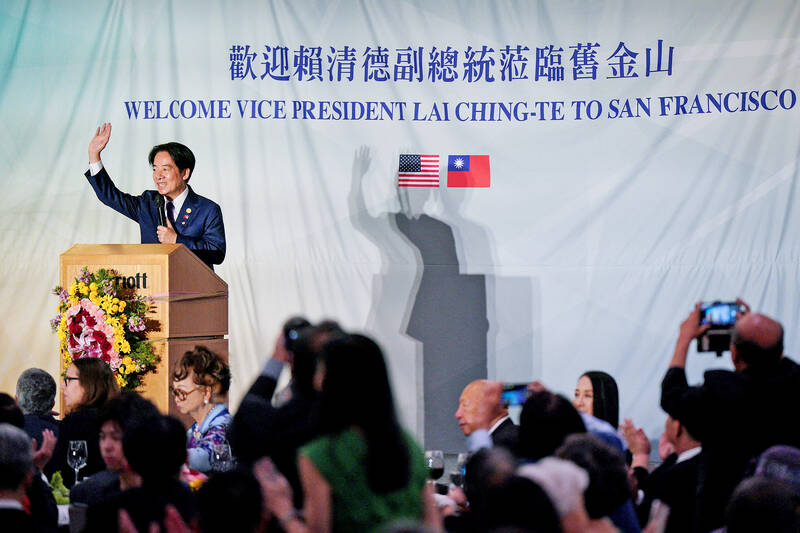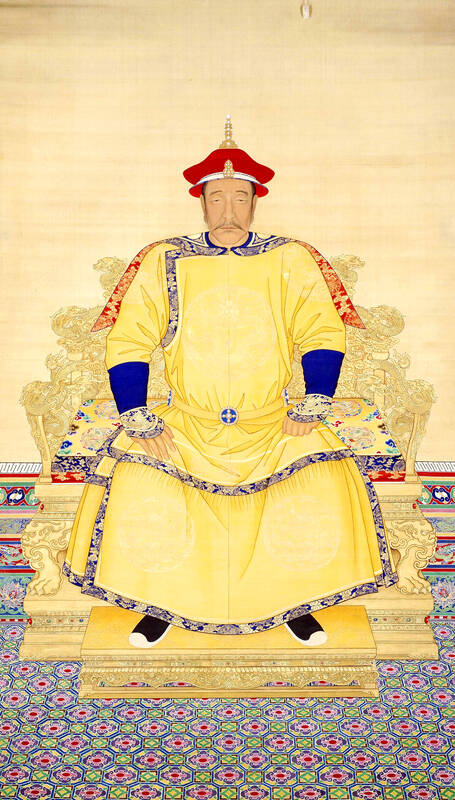The BBC last week published an article, “Taiwan VP a ‘troublemaker’ for US visit: Beijing,” on Vice President and Democratic Progressive Party (DPP) presidential candidate Willam Lai’s (賴清德) US transit on his way to and from Paraguay.
The piece forwarded People’s Republic of China (PRC) talking points in its headline and opening paragraphs, using quotes from Beijing to label Lai a “troublemaker.” Not until we reach the bottom of the article do we learn that Taiwan is a democracy, while Lai’s words are dismissed by the BBC as “common rhetoric.” No such context is supplied for Beijing’s verbiage.
The writers even put scare quotes around the term “authoritarianism” as a descriptor of the PRC.

Photo: Reuters
The report represented what many of us have come to expect as typical BBC writing on Taiwan, but it also highlighted another issue of media handling of PRC propaganda: the way Beijing’s military aggression around Taiwan is used in media presentations to reinforce the deployment of its talking points in the media.
Although this issue is inherent in much writing on PRC aggression towards Taiwan, the BBC piece provides an especially good example of this.
Kudos to the writers of the BBC report for forthrightly assigning the responsibility for tensions to PRC aggression. Many writers simply remove all agency from Beijing. Instead, the BBC stated that the PRC “launched” and “responded with” military activities against Taiwan.

Photo courtesy of Wikimedia Commons
Unfortunately, it did so in the context of asking readers to sympathize with the PRC’s dilemma in attempting to bloodily annex a neighboring democracy.
“This time China has a difficult path to tread,” the writers aver, in choosing the right level of aggressive military actions. Poor put-upon China!
The BBC did not bother to ask how Lai or Taiwan should respond to this existential threat. Instead, the reader is repeatedly requested to consider the “problem” of Lai visiting a fellow democracy from Beijing’s point of view. The lack of a Taiwan-centered perspective simply reinforces the idea that Lai is the problem and that Beijing’s aggression is a reasonable response.
CHINESE AGENCY
Thus, PRC military activities interact with Beijing’s talking points to mutually reinforce. The subtext is simple: the BBC may talk about the PRC “responding” but by dotting the article with PRC talking points, the writers rob the PRC of its agency as the aggressor state. It simply has to react to Lai’s transit (military activities), and has no choice (talking points).
But as many pointed out, when a president from the pro-PRC Chinese Nationalist Party (KMT) transited the US in 2008, the PRC simply smiled benignly. The PRC has complete agency.
The BBC could easily have pointed out that the PRC created this dilemma for itself with its relentless aggression, when it could have patiently wooed the Taiwanese (and every other nation along its borders) for the past few decades.
There are several other issues with the BBC piece. A longtime PRC goal has been to transfer tensions caused by its aggression against Taiwan to the US-Taiwan relationship. The BBC aided this effort by writing that “some analysts have warned that Mr Lai’s remarks may further escalate tensions between Washington and Taipei.” Exactly how Beijing wants the BBC to write, blaming Lai for Taipei-Washington issues, rather than Beijing’s aggression.
Observe how the phrase “further escalate” implies the existence of already high tensions. Indeed, in that piece, US-PRC relations are described as being at a low point, and there are “tensions between Washington and Taipei” but the idea of “tension” is not presented in the PRC-Taiwan relationship. Apparently all the gray-zone activities the BBC refers to do not cause tension.
The BBC piece also asserts that the Taiwan Relations Act (TRA) “states that the US must provide the island with the means to defend itself.” The TRA nowhere says that, and was in fact written precisely to avoid tying the US president’s hands on the provision of weapons. I have personally explained this to BBC representatives several times over the last couple of decades, complete with documentation.
No doubt two decades from now, doddering in my hospital bed and typing characters at the rate of one every 10 minutes, I will still be correcting the BBC on this point. I suppose it is good that the BBC has given my life meaning.
INSTITUTIONAL PROBLEM
Several people privately and publicly on Twitter pointed out to me that there are issues with the writers of that piece, which I will not name here because they are not relevant. The BBC has been forwarding PRC propaganda and deprecating Taiwan as long as I have been writing on Taiwan. The problem is institutional, not the province of any one writer.
As I write this there is a link to a BBC backgrounder embedded in that story titled “China and Taiwan: A really simple guide.” Consider this sentence about the entirety of its presentation of the island’s pre-modern history, which it frames as the question of whether Taiwan has always been separate from China: “Historical sources suggest that the island first came under full Chinese control in the 17th Century when the Qing dynasty began administering it.”
The Qing were Manchus, not Chinese. China was their colony and had no more agency of its own than India did under the Raj. Taiwan was never under “full Chinese control” and certainly not in the 17th century, when the vast majority of it was inhabited and controlled by Austronesian indigenous peoples. The first nation to fully control the island was another colonizing power, Japan.
I love the way the term “historical sources” is deployed in that sentence to make the 17th century appear as distant and mysterious as the Greek Dark ages or Harappan civilization, a subtle bit of orientalization of quite mundane history. That orientalization, that othering of Taiwan, has an important function in the presentation: the BBC would never argue that Ireland was part of the UK today because “historical sources” say England controlled it in the 17th century. But when that happens in the distant past of the inscrutable Orient…
Note too that it sweeps away thousands of years of indigenous Taiwan. Instead, like the BBC’s report on Lai’s trip, it locates Taiwan history in the greater history of China. The PRC’s point of view and its talking points again.
That comprehensively false assertion about history is followed a couple of sentences later by this gem:
“China took the island again in 1945 after Japan lost World War II.” Neither the Republic of China nor the PRC “took” Taiwan. Chiang Kai-shek (蔣介石) occupied Formosa and accepted the Japanese surrender on behalf of the wartime Allies. China did not acquire sovereignty over the island by those acts.
China still doesn’t have sovereignty over Taiwan. Except, of course, in the offices of the BBC.
Notes from Central Taiwan is a column written by long-term resident Michael Turton, who provides incisive commentary informed by three decades of living in and writing about his adoptive country. The views expressed here are his own.

The canonical shot of an East Asian city is a night skyline studded with towering apartment and office buildings, bright with neon and plastic signage, a landscape of energy and modernity. Another classic image is the same city seen from above, in which identical apartment towers march across the city, spilling out over nearby geography, like stylized soldiers colonizing new territory in a board game. Densely populated dynamic conurbations of money, technological innovation and convenience, it is hard to see the cities of East Asia as what they truly are: necropolises. Why is this? The East Asian development model, with

June 16 to June 22 The following flyer appeared on the streets of Hsinchu on June 12, 1895: “Taipei has already fallen to the Japanese barbarians, who have brought great misery to our land and people. We heard that the Japanese occupiers will tax our gardens, our houses, our bodies, and even our chickens, dogs, cows and pigs. They wear their hair wild, carve their teeth, tattoo their foreheads, wear strange clothes and speak a strange language. How can we be ruled by such people?” Posted by civilian militia leader Wu Tang-hsing (吳湯興), it was a call to arms to retake

This is a deeply unsettling period in Taiwan. Uncertainties are everywhere while everyone waits for a small army of other shoes to drop on nearly every front. During challenging times, interesting political changes can happen, yet all three major political parties are beset with scandals, strife and self-inflicted wounds. As the ruling party, the Democratic Progressive Party (DPP) is held accountable for not only the challenges to the party, but also the nation. Taiwan is geopolitically and economically under threat. Domestically, the administration is under siege by the opposition-controlled legislature and growing discontent with what opponents characterize as arrogant, autocratic

Desperate dads meet in car parks to exchange packets; exhausted parents slip it into their kids’ drinks; families wait months for prescriptions buy it “off label.” But is it worth the risk? “The first time I gave him a gummy, I thought, ‘Oh my God, have I killed him?’ He just passed out in front of the TV. That never happens.” Jen remembers giving her son, David, six, melatonin to help him sleep. She got them from a friend, a pediatrician who gave them to her own child. “It was sort of hilarious. She had half a tub of gummies,